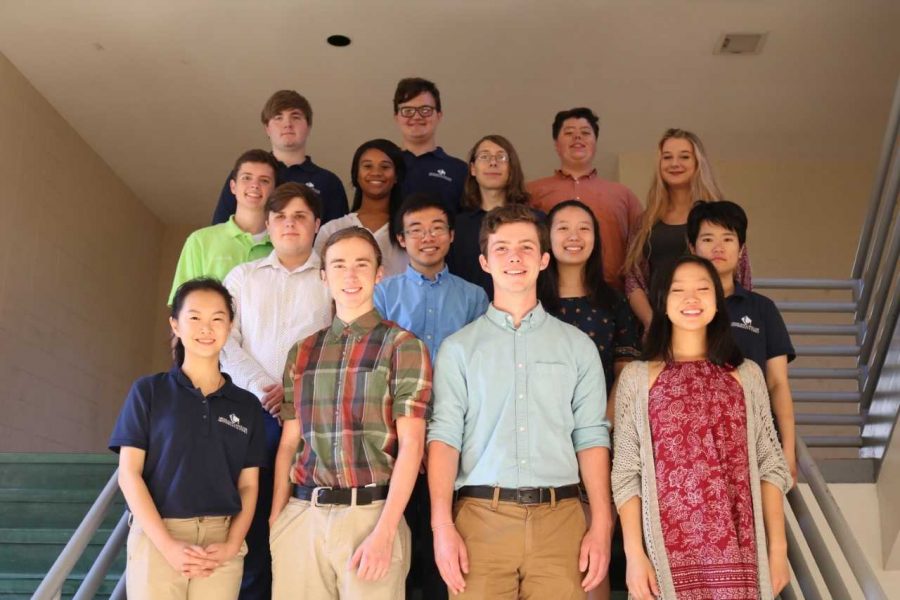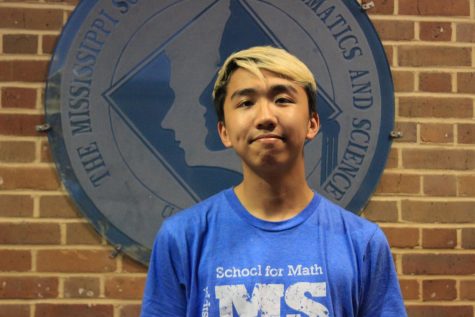MSMS Announces 15 National Merit Semifinalists
The fifteen National Merit Semifinalists pose for a photo at Trotter Convention Center .
September 24, 2018
On Sept. 12, College Board officially announced the PSAT cutoff scores for the class of 2019, and MSMS has produced 15 National Merit Semifinalists this year: Brady Suttles, David “Cade” Burton, Connor Chitmon, Elle Hinton, Hamilton Wan, Helen Peng, Jacob Lee, Kaelon McNeece, Lane Hughes, Lori Feng, Maria Kaltchenko, Michelle Luo, Samantha Anderson, Timothy Lewis and Victoria Gong.
PSAT is short for Preliminary Scholastic Assessment Test. The test is issued to measure reading, writing, and mathematics proficiency and to give a basis for students to determine how much preparation is needed for the Scholastic Assessment Test or SAT. The PSAT is administered every year to willing students in the eighth, ninth, tenth and eleventh grades, and juniors taking the test have the opportunity to submit an application to become National Merit Finalists and to qualify for the National Merit Scholarship Program.
MSMS Teacher and S.T.E.P. Club Sponsor Mrs. Lauren Zarandona has been dedicated advocated test as she hosts a PSAT prep panel for MSMS’s Juniors. “If you make about a certain cutoff score, it’s an opportunity to guarantee at certain institutions,” Zarandona said.
In order to be deemed as a National Merit Semifinalist, eleventh graders must score within a calculated threshold based off their individual state.
“It’s done based on each state individually and looking at a percentage above and below, and so they make it the cutoff for each state so they have a certain percentage above,” Zarandona said.
Although National Merit Semifinalist statuses are not announced until Fall of the following year, test takers are given two scores in December, one being an SAT formatted score ranging from 320 to 1520 and the other being the PSAT Selection Index ranging from 48-228.
This year, Mississippi’s cutoff PSAT Selection Index was a 215, two points higher than the Class of 2018’s. “I think we’re getting better at taking tests if you think about it,” Zarandona said. “MSMS had 13 STAR students last year for the ACT, and we didn’t even win for the state. If we see ACT scores getting better it makes sense that the PSAT scores would reflect that trend. Everyone has study materials at their fingertips and people know how to test now because we do it all the time, so you would expect it to improve.”
Mrs. Kelly Brown, MSMS’s Director for Academic Affairs, was thrilled when she heard the news that MSMS had 15 National Merit Semifinalists this year.
“I think it reflects the fact that we were able to recruit already high achieving students,” Brown said.
Although MSMS is known for its academic prowess, Brown does not believe MSMS is the sole cause for the students who attained their status.
“The fact of the matter with National Merit is, because that test comes in October, we realize that MSMS does not play a huge part in preparing students for that test,” Brown said. “We do a few things; I’m not saying we don’t do anything. We do that pump-up session at the beginning of the year, to practice tests, and teachers set up seminars and tutorials,” Brown continued. “We do things to help, but the reality of it is, from August to September, MSMS is not the deciding factor in National Merit.”
Brown owes it to the determination of the students and their home schools for their status. Additionally, Brown attributes the environment at MSMS for playing a role in the students’ success. “I think our culture at MSMS plays a huge part in helping students understand the importance of the test and wanting to their best,” Brown said.
Several of the MSMS National Merit Semifinalists expressed a variety of emotions to the news.
MSMS Senior Lori Feng was one of the 15 students to earn the prestigious title. When she learned news of her status, she was ambivalent about the matter.
“I’m not the best standard test taker,” Feng said. “I thought I did a lot worse this year than I did previous years, so I was benching on not getting National Merit Semifinalist.”
Feng believes her comprehension skills naturally increased through workload at MSMS. “Junior year, I took the most classes I had ever taken overall my high school years, so just having to read so many different chapters, whether in math books or English textbooks, increased my reading speed a lot,” Feng said.
MSMS Senior Samantha Anderson also received the honor of being named National Merit Semifinalist. When she learned of the news, Anderson felt relieved of the fact. “It feels good for once that testing meant something,” Anderson said, “I actually did study for the PSAT, so I was happy to get a high enough score to get Semifinalist.”
Anderson owes her score growth from her PSAT in tenth grade to her transition from Terry High. “I took it the year before in tenth grade just for practice. I scored like a 1360, so I think that difference had to do with being here, especially in my math section. I actually talked to Dr. Benge the night before and got help with it,” Anderson said.
MSMS Senior David “Cade” Burton is excited to see how much farther he can get in the program. Burton had prior experience with the test as his homeschool offered the PSAT to him as a tenth grader, so he attributed his score increase to his transition from Hernando High. “My math score changed a good bit. I want to say I could’ve gotten National Merit without it, but I think it helped me want it more.”
On Oct. 10, MSMS’s junior class will be up to take the test to determine their eligibility for the prestigious status. MSMS junior Rachel Zheng will be one of 234 students to take the test that will give them a competitive edge for college admissions.
“Other than the practice test we’ve taken in August, I’ve worked using Khan Academy. I want to go up. Hopefully, not only can I get National Merit Semifinalist for Mississippi, but also have it comparable with states like Massachussetts,” Zheng said.
Brown hopes that the trend will follow for the class of 2020. “Every year we have been very fortunate that our academic standards have stayed the same or inched up. I do think the class of 2019 has laid the groundwork and the gauntlet, so to speak, for the class of 2020.”









